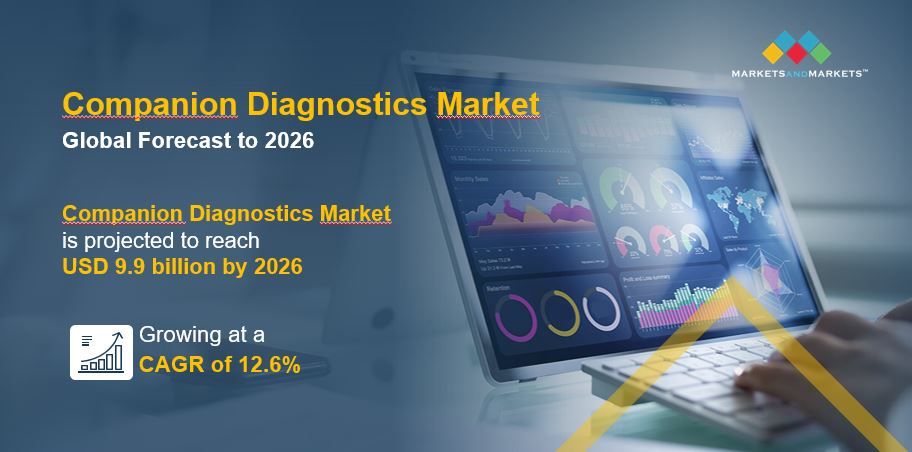Companion Diagnostics: The Future of Precision Oncology
Definition of Companion Diagnostics:
Companion diagnostics are diagnostic tests that are used to identify patients who are most likely to respond to a certain treatment. They are used to identify which patients should receive a specific drug or therapy, and they may also help to predict which patients are at risk of developing side effects. Companion diagnostics are a key part of personalized medicine, as they enable physicians to tailor therapies to individual patients.
Overview of Companion Diagnostics Market:
Companion diagnostics are tests used to diagnose and select the most effective treatment for a given patient. They are used to identify patients with specific biomarkers that may be responsive to a therapy. They are also used to identify patients who may be at high risk of developing a disease or those who may be resistant to a particular treatment. Companion diagnostics are used in various areas such as oncology, neurology, cardiovascular, and infectious diseases.
The report "Companion Diagnostics Market by Product (Assays, Kits, Software & Services), Technology (PCR, NGS, ISH, IHC), Indication (Breast, Blood, Lung, Colorectal Cancer, Neurology Diseases), End User (Pharma Companies, CROs), Region - Global Forecast to 2026", the global companion diagnostics market is projected to reach USD 9.9 billion by 2026 from USD 5.5 billion in 2021, at a CAGR of 12.6%.
Market Dynamics of Companion Diagnostics:
Increasing Demand for Personalized Medicine: The demand for personalized medicine is growing rapidly, driven by the need to provide tailored treatments for patients. As companion diagnostics can provide personalized medical information on individual patients, they are increasingly being used to develop more effective treatments.
Advances in Technology: Advances in technology, such as next-generation sequencing, have enabled the development of more sophisticated and accurate companion diagnostics. This has increased their popularity among healthcare providers and pharmaceutical companies, as they can provide more detailed information about a patient’s condition.
Regulatory Requirements: Regulatory requirements are an important factor driving the growth of the companion diagnostics market. Governments around the world are increasingly mandating the use of companion diagnostics in order to ensure the safety and efficacy of new drugs and treatments.
High Cost of Diagnostics: The cost of companion diagnostics can be high, making it a barrier to market growth. The high cost of the technology and tests can limit the market’s potential to expand.
Low Awareness: Low levels of awareness about companion diagnostics is another major factor that can limit its market growth. Many patients and healthcare providers are not yet aware of the benefits of using companion diagnostics, which can limit its adoption.
Speak to Analyst: https://www.marketsandmarkets.com/speaktoanalystNew.asp?id=155571681
Market Segmentation:
By Product & Service
· Assays, Kits & Reagents
· Software & Services
By Technology
· Polymerase Chain Reaction
· Next-generation Sequencing
· In Situ Hybridization
· Immunohistochemistry
· Other Technologies
By Indication
· Cancer `
o Lung Cancer
o Breast Cancer
o Blood Cancer
o Colorectal Cancer
o Other Cancer Types
· Neurological Disorders
· Cardiovascular Diseases
· Infectious Diseases
· Other Indications
By End User
· Pharmaceutical & Biopharmaceutical Companies
· Reference Laboratories
· Contract Research Organizations
· Other End Users
By Region:
· North America
· Europe
· Asia Pacific
· Latin America
· Middle East & Africa
The global companion diagnostics market is moderately competitive owing to the presence of several established players and the entry of new players. These players are actively launching new products and introducing innovative technologies to remain competitive in the market. This has been leading to the expansion of the global companion diagnostics market.
The major players operating in this market are F. Hoffmann-La Roche Ltd. (Switzerland), Agilent Technologies, Inc. (US), Qiagen N.V. (Germany), Thermo Fisher Scientific, Inc. (US), Abbott Laboratories, Inc. (US), Almac Group (UK), Danaher Corporation (US), Illumina Inc. (US), bioMérieux SA (France), Myriad Genetics, Inc. (US), Sysmex Corporation (Japan), Abnova Corporation (Taiwan), Guardant Health, Inc. (US), ICON Plc (Ireland), BioGenex Laboratories, Inc. (US), Invivoscribe Technologies (US), ArcherDX, Inc. (US), NG Biotech (France), Q² Solutions (US), Amoy Diagnostics Co., Ltd. (China), Abacus Diagnostica Oy (Finland), Asuragen Inc. (US), SAGA Diagnostics (Sweden), Meso Scale Diagnostics, LLC. (US), and Creative Biolabs (US).
Recent Developments:
· In May 2021, Qiagen N.V. (Germany) expanded the therascreen KRAS Kit.
· In April 2019, Roche Diagnostics (Switzerland) acquired TIB Molbiol Group (Germany). This acquisition will enhance Roche’s broad portfolio of molecular diagnostics solutions with a wide range of assays for infectious diseases, such as identifying SARS-CoV-2 variants.
Conclusion:
The companion diagnostics market is set to experience rapid growth in the next five years. This growth is being driven by the rising prevalence of chronic diseases and the increasing demand for personalized medicine. Additionally, the development of new technologies and the increasing number of clinical trials for companion diagnostics are expected to further boost market growth. The increasing collaboration between pharmaceutical companies and diagnostic companies is also expected to play a role in the growth of the market.
https://www.marketsandmarkets.com/Market-Reports/companion-diagnostics-market-155571681.html
https://www.marketsandmarkets.com/PressReleases/companion-diagnostics.asp
https://www.marketsandmarkets.com/ResearchInsight/companion-diagnostics-market.asp

Appreciate the creator